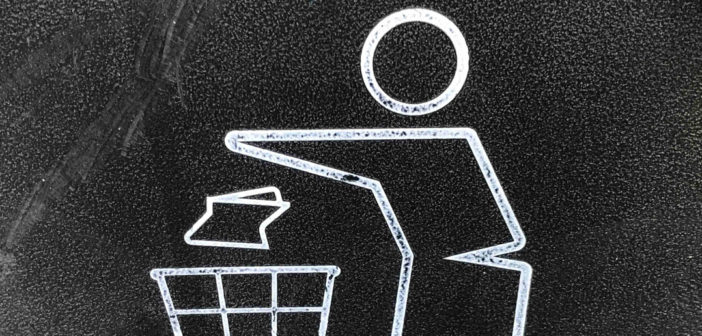The concept of the “discard” phase in a narcissistic relationship, only to be replaced very quickly by a new partner (commonly referred to as “new supply” by targets of narcissistic abuse) has been an interest of mine for two years. If you’re reading this, then you can surmise that this interest is born out of personal experience.
In the early days of my own gay toxic relationship’s end, as I sorted through the proverbial wreckage, I posed to Google many variations of this one question:
How can someone easily replace one person with another?
It didn’t take long for me to find the essay from the Little Shaman titled, “What Happens When a Narcissist Discards You?”
I also found this writing from Natasha Adamo on her then-branded Post Male Syndrome blog—“Is My Ex Happy In His New Relationship?”
And I’d be remiss if I didn’t mention Savannah Grey’s blog post, “Narcissists and Betrayal,” from her Esteemology website.
I still have a folder labeled “Narcissism” in my Safari browser’s Favorites, neatly organized into a multitude of subfolders sorted by different sources. But these three stand out because of how much I read them during the fall of 2018. They weren’t even blog posts at the time—they were spiritual mantras, and their words helped move me forward—at a minuscule, glacial speed in the beginning—into a state of profound realization. I was finally—and truly—aware of all the toxicity that existed my gay narcissistic relationship, and how fortunate I was to be free and moving on with my life.
I eventually learned about Dr. Ramani Durvasula, whose book, Should I Star Or Should I Go: Surviving A Relationship With A Narcissist, became a handbook-bible hybrid for my own psychological mending after the end of my gay narcissistic relationship, which I write about in a two-part blog post. Click here to read the first part and here for the second, if you’re interested.
But in all of Dr. Ramani’s writings and videos on YouTube and MedCircle, she’s never pointedly discussed the concepts of being discarded from a narcissistic relationship and then witnessing a lightning-fast replacement with a new romantic source of narcissistic supply.
I did, however, isolate a section where Dr. Ramani directly discusses the topic of new supply in a live Q&A she did on Youtube back on 07 November 2019, which you can read here.
With all of that said, I then came to find a new eight-minute segment from MedCircle that’s available for free on Youtube, and it’s titled, “How To Break Up With A Narcissist.”
MedCircle host Kyle Kittleson talked, in part, with Dr. Ramani about the experience of breaking up with a narcissist—both if it is you that leaves or if it is the narcissist. And the topic of a replacement partner factored in heavily to Dr. Ramani’s responses. I found what she said so vitally important to be easily accessed and read that I transcribed most of her commentary, which I am sharing below:
KYLE KITTLESON: Leaving a relationship is difficult. Leaving a narcissistic relationship seems to be harder. Why is it harder and how do they leave?
DR. RAMANI DURVASULA: Oh, absolutely—many times people leave narcissistic relationships from a place of frustration, exasperation, fear, confusion; these are not healthy states.
I mean, ending a relationship is always difficult, but if it was a relationship with two healthy people in it, they may simply be able to acknowledge, “we grew apart, and this hurts, and thank you for being a part of my life…” I’m not saying no one gets hurt. It hurts and it hurts badly.
But in a narcissistic relationship, by the time you get to the breakup point, there have been lies, deceit, anger, rage, all kinds of negative situations. it’s confusing.
Now, a couple of other things happen too. Many times when people leaves a narcissistic relationship, they’ve tried everything. They’ve tried to “change” the person, which is obviously never going to work. But they keep trying.
“I’m going to convince them. I’m going to show them the error of their ways.”
But one of the big fears that keeps people in narcissistic relationships and makes it hard to leave is this idea that the minute they leave the relationship the narcissist is going to change and be a better person for the next person they date. I heat that all the time.
“He’s going to change. And now he’s going to be really great to this next person.”
I say, “why, why would that happen?” They’re going to go through exactly what you went through. If anything, you should send them a condolence card now.
In reaction to this, host Kyle Kittleson says the following: “And even if they did change for somebody else, they’re not changing for you, so who cares…”
I must say—that is the absolute worst thing you could ever say to someone who is emerging from a troubled relationship marred by narcissistic abuse. It invalidates the person’s experience by indirectly saying:
“Well, perhaps there was something wrong with you and your relationship if your former partner treated you poorly and is now treating another person better… maybe something different could have been tried that this new partner is already getting right… it looks like there is a chance this won’t repeat because you’re not apart of the romantic equation anymore.
This is not true at all—in any way, shape, or form. Pathological narcissism is a personality structure that influences all aspects of the narcissist’s life. For a true, long-term change to happen romantically in a narcissist’s life, the individual would need to recalibrate all attitudes toward work, finance, family, hobbies—hell, even dealing with traffic.
So if you’re reading this and you have experience with a narcissist romantically, then I ask you: can you see all of this changing, longterm, for the better? Trust me, the answer is a resounding “no.”
Anyway, Dr. Ramani takes control of the conversation again:
DR. RAMANI DURVASULA: They’re not going to change, so they’re not changing for you.
Many times, narcissists trade into a new relationship very quickly, because relationships are so superficial for them. For the rest of us, leaving a relationship that meant something to us, or even was just confusing, our roots went deep, so it takes awhile before you can reconstitute and enter a new relationship.
Narcissists—boom. They’ve often replaced you by next Saturday night, They’ll post it on social media. It’s really, really destabilizing for people.
The conversation moves into a discussion about hoovering before returning to the topic of a narcissist leaving his or her partner, known and the “discard phase” in a narcissistic relationship.
In Dr. Ramani’s own words again:
DR. RAMANI DURVASULA: Now, on the flip side, if the narcissist leaves you, of course, my temptation is to throw you a parade and say that you are lucky. But that’s not how people feel. They feel abandoned; they feel like, “I’ve done everything and this person has the nerve to leave?”
KYLE KITTLESON: Is it likely a narcissist would leave someone?
DR. RAMANI DURVASULA: Heck yeah! They replace people all the time. They trade partners. They want someone younger…
KYLE KITTLESON: They trade up…
DR. RAMANI DURVASULA: Yeah, they trade up… well, I would say they trade down because the person they left is usually a solid, loving person, but they’ll choose someone younger, someone richer, someone they met at work, and they will think nothing of just switching out like that.
And so, people will feel very hurt. A narcissist will typical not leave a relationship unless they already got someone waiting in the wings that would be too much of an ego blow for them. So under those conditions, they very well may leave.
But most commonly, narcissists like to have their cake and eat it too. If they’re married, they’re going to try and have the affair on the side and make it all work and be so surprised they they’re told, ‘oh, you can’t have both, so sometimes these things can kind of blow up in their faces.
Take it from me—if you’re experiencing a discard after a long and grueling narcissistic relationship, you will find comfort in these words from Dr. Ramani Durvasula.
With all that said, are you dealing with your own toxic relationship? Are you stuck in a situation you’re unsure of?
Don’t hesitate to reach out.
I’d love to hear your story and offer some advice if I can. Share in the comments or send me an email anytime.
* * *
Confused by some of the terminology I use to describe people and places?
Check out the Gay Narcissistic Relationship Glossary for more information.
* * *
If you’re interested in learning more about narcissism, toxic relationships, dark personalities, and sexuality, then I highly recommend the books below.
Please consider buying through the provided Amazon Associate links. While the content on my website is yours to read for free, I do appreciate any support offered toward my work.
The reading list includes:
Should I Stay Or Should I Go: Surviving A Relationship With A Narcissist (Dr. Ramani Durvasula)
The Human Magnet Syndrome: The Codependent Narcissist Trap (Dr. Ross Rosenberg)
The Sociopath Next Door (Dr. Martha Stout)
Without Conscience: The Disturbing World Of The Psychopaths Among Us (Dr. Robert D. Hare)
In Sheep’s Clothing: Understanding And Dealing With Manipulative People (Dr. George Simon)
Rethinking Narcissism: The Bad—And Surprising Good—About Feeling Special (Dr. Craig Malkin)
Being Homosexual: Gay Men And Their Development ( Dr. Richard Isay)
The Velvet Rage: Overcoming The Pain Of Growing Up Gay In A Straight Man’s World (Dr. Alan Downs)






2 Comments
Thank you very much for the understanding of all this Narcissist Personality .. Never been Exposed to such betrayal. Working on my own recovery from the confusion. . Thank God. …
I’d like to add one thing that wasn’t touched upon in the interview. When a narc replaces you overnight and appears to treat the new supply better than he treated you, (I’ll use the pronoun ‘he’ for simplicity’s sake) you have to remember how your own relationship with the narc began, because the narc follows the same rote pattern with all supply. In the ‘honeymoon phase’ of your
relationship, the narc was love bombing you to get you to attach quickly and intensely. That’s what’s happening with the new supply. And we all know that phase doesn’t go on forever. Once they’ve got you, the devaluation phase begins. The narc will want you to believe he and his supply are blissfully happy—something he could never achieve with you. But it’s a lie, and it’s presented for the purpose of making you feel ‘less than,’ because the narc feeds off of the pain that causes you. It makes him feel powerful and important enough to keep you suffering.
In my experience, narcs discard those who expect greater emotional intimacy, which is threatening to the narc. The vast majority of their relationships are shallow, but if someone comes along who pushes them too far from their comfort zone, they’ll discard—especially when the supply is getting close to giving up on the relationship, in which case, the narc’s ego demands that he beat his supply to the punch.
If the supply you’re being replaced with is less invested in your narc than you were, they’re typically content to keep things on the shallow side, which is both more and less comfortable for the narc. More, because there’s less risk of the supply seeing the narc’s inner shame and self-loathing; but less because the supply doesn’t become aa deeply attached, so the narc can’t completely relax in the knowledge that ‘this one’s in the bag.’ He will have to work harder to keep this supply engaged, which will require more frequent love bombing, and less frequent or less intense devaluation, if any. A narc can have hundreds of friendships that will never go thru the decline and eventual discard that your relationship did because they’re all so much more superficial. And these other sources of supply are harder to win and to keep, so they remain a challenge to the narc, who continues to try to ‘win’ them anew at each encounter.
The narc doesn’t have a ‘better relationship’ with the new supply than he has with you. It will end in a discard, just as your relationship did, because that’s the only game a narc knows how to play. The only exception is if the new supply is also narc, and is the stronger of the two, in which case, the narc will find himself in your situation, and may ultimately be discarded, himself. And if this happens, and the narc goes into seeming paroxysms of pain and grief, it’s not over losing someone he loved more than he loved you. It’s over the temporary slip of the mask, where the original narcissistic wound has been reawakened, and the narc is no longer able to hide from their toxic shame.
But narc’s have 9 lives. Their capacity for denial is limitless, and eventually, they’ll find a way to bounce back—always in the form of new supply.